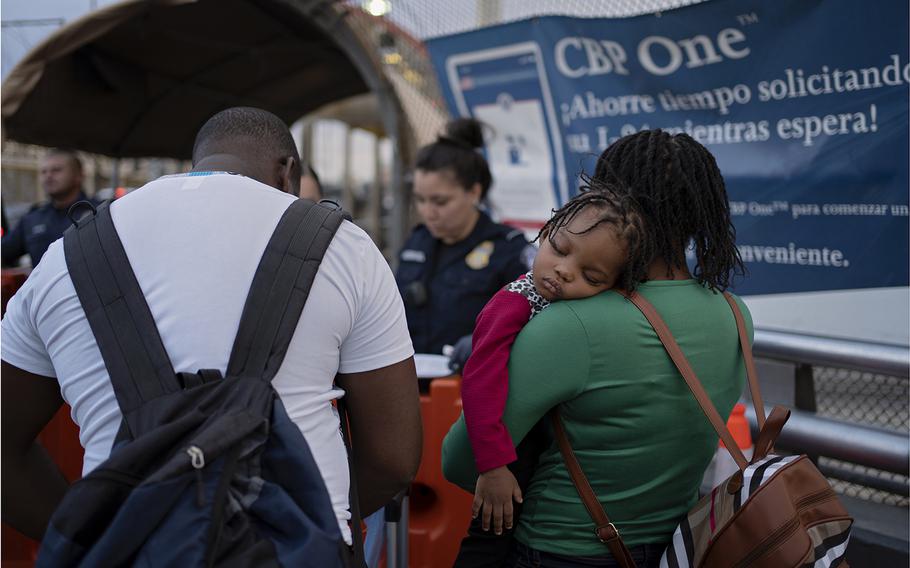
Haitian migrants, who have an appointment via the CBP One app, show their documents to U.S. Border Patrol agents on the Paso del Norte Bridge between El Paso, Texas, and Ciudad Juárez, Mexico. (Danielle Villasana for The Washington Post)
Dozens of elected officials in Maryland - all Democrats - are calling on the Biden administration to continue providing “safe haven” to hundreds of Haitian immigrants in the state who were legally admitted into the United States at border crossings over the past 14 months but are now facing proceedings that could result in their deportation.
In a letter last month to Homeland Security Secretary Alejandro Mayorkas, the legislators from across Maryland said the Haitian immigrants were admitted to the country to pursue asylum claims but were immediately placed into removal proceedings even though the situation in Haiti continues to worsen.
An unprecedented surge in gang violence is plaguing Haiti, with the number of victims killed, injured and kidnapped more than doubling last year, a U.N. special envoy reported to the U.N. Security Council last month.
The Maryland elected officials, including state senators, delegates, county council members and mayors, as well as Democratic U.S. Senate candidates Rep. David Trone and Prince George’s County Executive Angela Alsobrooks, requested the administration end removal proceedings and expand eligibility for temporary protected status (TPS) for Haitian nationals to include those who entered the country up to Jan. 1, 2024, or later. Currently only Haitians who can demonstrate continuous residence in the United States dating back to Nov. 6, 2022, are eligible for the TPS designation that now extends through Aug. 3.
“These Haitian newcomers are not enforcement priorities … as they did not enter the U.S. unlawfully and have no criminal records,” the representatives wrote in the letter which was organized by Montgomery County Councilmember Kristin Mink and is signed by all the Montgomery County council members and Montgomery County Executive Marc Elrich.
The letter asked the Department of Homeland Security to renew and extend “humanitarian parole,” an emergency authority that allows migrants to temporarily enter the United States, that would let Haitian immigrants get work permits and apply for asylum if they so chose.
The letter writers want the administration to back off enforcement efforts to remove those Haitians who aren’t covered by TPS, Mink said in an interview.

Montgomery County Council Member Kristin Mink is leading an effort to secure temporary protected status for Haitian immigrants in Maryland. (Ricky Carioti/The Washington Post)
“By Biden’s own policy, we should not be moving forward with court proceedings for these folks,” she said. “The fact that we are spending court time and resources pursuing removal proceedings against them doesn’t make any sense on just a slew of levels, not the least of which is the fact that Haiti is in a totally unmanageable state right now.”
The State Department issued a sweeping travel advisory in July warning Americans not to travel to Haiti “due to kidnapping, crime, civil unrest, and poor health care infrastructure.” The agency also ordered the departure of family members of U.S. government employees and non-emergency U.S. government employees.
The vast majority of the recent Haitian immigrants have used the CBP One mobile app to request an appointment at an official U.S. port of entry and enter the country legally. Mink said it was hard to determine exactly how many Haitian immigrants in Maryland are impacted by not having TPS protections, but estimates there are several hundred in Montgomery County alone and that up to a thousand in the state may be affected. How many are facing imminent removal proceedings is also unclear, she said.
There are approximately 16,500 Haitian Americans living in Maryland, according to a 2021 U.S. Census survey. About 1.1 million people living in the United States are of Haitian descent.
Asked for comment on the letter sent by the Maryland officials and the procedural changes they are requesting the department make, a DHS spokesperson replied via email that “DHS responds to official correspondence directly via official channels.” Mink said she had not yet received a response from the department.
The Immigration and Nationality Act (INA) allows the secretary of homeland security to use their discretion to parole any noncitizen applying for admission into the United States temporarily for urgent humanitarian reasons or significant public benefit.
Kathleen Bush-Joseph, a policy analyst and lawyer at the nonpartisan Migration Policy Institute in Washington, said that whenever the administration designates a nationality group for temporary protected status it sets entry dates and typically backdates them so only people who entered before that date are eligible to apply. “One of the reasons for doing that is to try to not encourage people to come in the hope of receiving the protection,” she said.
Bush-Joseph said the Biden administration is currently using its prosecutorial discretion guidelines in removal proceedings. And it is making sure those determinations are made on a case-by-case basis. There are currently 698,00 people - a record high - in the United States covered by temporary protected status, she said.
Genevieve Augustin, director of legal services at the Central American Resource Center (CARECEN), a social services nonprofit in Washington that provides assistance to immigrants, said her organization is currently working with about 70 Haitian migrants to help them with their cases. What they are seeing, she said, is that in the past Haitians who followed procedures and entered the country legally were paroled at the border, which means they were given time, typically a year, to pursue asylum.
But, Augustin said, many of the Haitians who arrived legally in the past 14 months were placed immediately in removal proceedings at the same time they were paroled. “Placing them in removal proceedings defeats the parole that they were granted to seek asylum,” she said. “It just really doesn’t make any sense where you would give somebody something and then immediately take it away.”
The removal proceeding begins when DHS provides an individual with a notice to appear in immigration court. It is the start of the legal process and does not mean that the recipient will be automatically removed.
A 36-year-old Haitian woman who arrived legally at the southern border in September, and has been notified that removal proceedings have begun against her, said in an interview that she fled Haiti in July after being raped at her home in Port-au-Prince and then continuously threatened by her attackers. The woman, who spoke through an interpreter provided by CARECEN, asked that her name not be used, so as not to endanger family members in Haiti.
Following two months of travel through Central America and Mexico, the woman said she was able to cross the border legally after being questioned and fingerprinted.
She described a lawless situation in Haiti that has only grown worst over the past year. Being sent back there, she said, “would be a really bad situation.” Being able to share her story, she said, made her “feel victorious and like I was not, in essence, the victim of what has happened to me.”